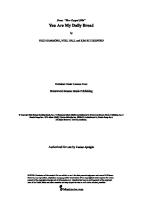You Are My Friend, Arent You
Lesson 84: You are my friend, aren’t you? Tag questions Objetivo: emplear las preguntas para confirmar información. Ta
Views 132 Downloads 2 File size 304KB
Recommend stories
- Author / Uploaded
- orlandini2000
Citation preview
Lesson 84: You are my friend, aren’t you? Tag questions Objetivo: emplear las preguntas para confirmar información.
Tag questions It’s a special construction added at the end of the sentence. We use it to make sure the information is correct or to seek agreement.
Structure: Affirmative sentence + Today is Monday
Tag question
, + Auxiliary + subject + ? (Affirmative or negative)
, isn’t it? , didn’t you? , don’t you? , has she?
Negative sentence + Angie hasn’t arrived yet
Negative tag , isn’t it? Affirmative tag , has she?
We use the auxiliary verb according to the main sentence and the same subject (personal nouns are usually replaced by personal pronouns.)
Example: You live in Bogota ,don’t you? Diego hasn’t eaten , has he?
Tag questions Rule
Example
When the tag includes I + be in negative, it can be replaced by “aren’t I” in spoken English.
-
I am right, am I not? I am right, aren’t I?
When the sentence has negative words, they take affirmative tag.
-
She had never done that, had she? Nobody came to the party, did they?
“They” is usually used in tag questions to refer to indefinite pronouns (everyone, everybody, someone, etc.)
-
Everyone had an invitation, didn’t they?
In sentences with there + be, “there” is also used in the tag.
-
There are many people in the party, aren’t there?
The tag pronoun for this / that is “it”. The tag pronoun for these / those is “they”.
-
This / that is your dictionary, isn’t it? These / those are Felipe’s shoes, aren’t they?
-
You should pay more attention to your healthy habits, shouldn’t you?
Modal verbs are used in the main sentence and in the tag.
Tag questions Choose the corresponding tag question: 1. Nobody called, _____________ a. didn’t they? b. did they? 2. We must not lock the doors,_____________? a. must we? b. mustn’t we? 3. He's still sleeping,________________? a. is he? b. isn’t he?
English is easy You can do it! Autor de la metodología: Francisco González Cifuentes Supervisión académica: Mayra Teresa Hurtado Mendoza Diseño y adaptación: Diana Paola Perez Muñoz Fotografía e imágenes: www.shutterstock.com / www.freepik.com









